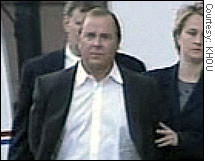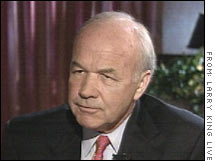|
Enron trial no Lay-up
With all we know about Enron, convicting Lay and Skilling may seem like a sure win. It's not.
NEW YORK (FORTUNE) - Suppose as an epilogue to "The Emperor's New Clothes," the humiliated potentate had been brought up on charges of public lewdness. Putting aside sovereign-immunity issues, what should the jury's verdict be? Well, the emperor should obviously be acquitted because he never intended to go naked in public; he really believed he was wearing something, even if he couldn't see exactly what it was.
To commit most crimes, one has to intend to do something wrong. Accordingly, truly deluding oneself -- gullibly trusting a deceitful subordinate (in the emperor's case, the tailor), relying on yes-men advisors, resting undue confidence on one's own innovative brilliance -- is a defense. An individual cannot be a criminal unless he has a certain baseline level of self-knowledge. Without that, psychiatrists may have labels for him, but the penal code does not. At their criminal trial Jeffrey Skilling and Ken Lay will each advance defenses closely analogous to the naked emperor's: They were tragically misled, their attorneys will argue, by a small group of deceitful subordinates (chief financial officer Andrew Fastow and his minions); their actions were blessed at every turn by seemingly illustrious advisors (sycophantic accountants at Arthur Andersen, blindered lawyers at Vinson & Elkins and a passive board of directors); and perhaps, too, they got a little carried away by their own presumed innovative brilliance during the irrational exuberance of the late 1990s bubble economy. In this context, their attorneys may suggest, the defendants believed they had discovered a legitimate business model that relied heavily upon the use of extremely complex, structured finance transactions that, in hindsight, may have proved unsound. A surprisingly suspenseful trial
Though such a defense might seem preposterous at first, its validity for defendant Lay has already been largely conceded by the government. Lay's alleged criminal wrongdoing, according to the indictment, is confined almost entirely to the very waning moments of the Enron debacle, by which point Enron's fate was all but sealed. So this trial is likely to be hard fought, perplexing and surprisingly suspenseful. The specifics of the government's case, led by Enron Task Force director Sean Berkowitz, a seasoned assistant U.S. attorney from Chicago, will vary greatly for the two defendants, reflecting their differing roles at the company. Though founder Lay was chairman and CEO from 1986 through February 2001, Skilling effectively began running the company in January 1997, when he became president and chief operating officer. In February 2001, Skilling formally became CEO, and after he resigned the following August, Lay resumed control of the company -- really for the first time since 1997. By that point Enron's once-highflying stock had already lost half its value, its accounting wizardry was self-destructing and credit agencies were weighing whether to downgrade the company's debt to junk status (a fatal blow for a trading company). On Dec. 2, 2001, the company filed for bankruptcy protection. Formally, the first count of the indictment does charge both Skilling and Lay with involvement in a single overarching conspiracy, lasting from late 1999 to December 2001, to commit wire fraud and securities fraud by unfairly representing Enron's true financial condition to investors, the U.S. Securities and Exchange Commission, stock analysts and credit-rating agencies. But the men's alleged roles in the conspiracy barely overlap in time. Lay is charged with very few conspiratorial acts prior to Skilling's August 2001 resignation, and Skilling with none after it. For the same reason, the two men are not jointly charged in any of the indictment's 40 remaining counts (mainly wire and securities frauds), 34 of which name Skilling alone, while six name only Lay. The case against Skilling
The case against Skilling goes like this: Enron's key legitimate business involved trading in contracts to deliver natural gas. Wall Street is wary of trading operations, however, because of their unreliable earnings. Skilling therefore maintained publicly that Enron was much more than a trading company and supported his claim by seeing to it that Enron showed remarkably smooth earnings growth every quarter, at a 15 percent to 20 percent annual clip. Wall Street loved what it saw, Enron's stock soared, and its officers became rich. (Between 1998 and 2001, Skilling earned $14 million in salary and bonus and netted $89 million from stock and options.) Enron's earnings growth was all a mirage, though, according to the government. Skilling and his subordinates created that appearance by using a variety of sham transactions. Many of them involved end-of-the-quarter "sales" of assets to partnerships that were treated for accounting purposes as if they were independent companies, even though they were effectively being run by Enron's own CFO, Fastow. What makes this alleged fraud -- let's call it the level-one fraud -- difficult to prove is that Enron's outside accountants, attorneys and board signed off on most of the machinations. If the lawyers, accountants and board thought that all the prestidigitation was legitimate, how will the government prove beyond a reasonable doubt that Skilling knew it wasn't? To make matters more challenging for prosecutor Berkowitz, Skilling's counsel, Daniel Petrocelli of Los Angeles, will try to call a long roster of expert business and accounting witnesses, led by University of Chicago law professor Daniel Fischel, to vouch for the reasonableness of Skilling's judgments, in context. (U.S. District Judge Sim Lake has not yet ruled on which experts' testimony, if any, he will allow.) As we now know, Fastow was using additional trickery -- oral side deals, secret guarantees and the like -- that were not disclosed to Arthur Andersen or V&E or the board, and which, if known to them, would have made it crystal clear that Enron's accounting for those transactions was bogus. Call this the level-two fraud. But it may be hard for Berkowitz to prove that Skilling knew about the level-two fraud. If Fastow claims Skilling knew, he may lack credibility, since Fastow is widely considered the most deceitful of all the Enron players. A more credible government witness might be Richard Causey, the former chief accounting officer, who had been scheduled to be tried with Skilling and Lay before his surprise guilty plea late last month. But Causey has never yet publicly acknowledged that even he knew about Fastow's side deals, let alone that he has any reason to believe that Skilling knew about them. Still, even if the government can't convict Skilling with respect to Fastow's deals, Skilling is not home free. The indictment charges him with additional criminal schemes that have nothing to do with Fastow. Skilling led, for instance, a structural reorganization during the first quarter of 2001 that was allegedly designed to conceal from the public enormous losses at a ballyhooed retail unit. Chief accounting officer Causey specifically backed this allegation in his plea-agreement filings. Finally, Skilling also faces ten insider-trading counts based on sales of Enron stock from April 2000 to September 2001. The fate of these counts, however, is logically tied to that of the fraud charges: i.e., Skilling had inside information only to the extent that the company's financial statements were fraudulent and he knew it. The case against Lay
The case against Ken Lay is far more condensed and correspondingly harder to prove. Remarkably, Lay is not charged with any of Fastow's frauds, though he profited from them more than anyone else. (From 1998 to 2001 he took home $19 million in compensation and $217 million in stock and options.) Lay is also not charged with any insider trading, an apparent concession that, as his attorney Michael Ramsey of Houston has long claimed, Lay's stock sales were involuntary (necessitated by margin calls). What is Lay charged with, then? In part, he's accused of irresponsible corporate cheerleading at a time when the company was headed to hell in a handbasket. "The third quarter is looking great," he told employees during an online forum on Sept. 26, 2001. "We will hit our numbers.... The balance sheet is strong." In fact, the government maintains, Lay already knew that Enron would be taking a significant loss for that quarter (announced Oct. 16, 2001), that it would be recognizing a $1.2 billion reduction in shareholder equity due to an accounting error, and that its balance sheet reflected $7 billion in "embedded losses." Lay is also charged with making more specific misrepresentations, including misleading the Arthur Andersen accountants about his plans for a British subsidiary, Wessex Water Services, in an effort to avoid taking a $700 million write-down. At the broad-brush level, Lay will probably say that he believed what he said at the time he said it and that any misstatements were innocent and too immaterial to mislead investors. As to the more specific charges, Lay's counsel Ramsey has given notice that he, too, will try to call experts, including Jerry Arnold, an accounting professor at the University of Southern California, to back Lay's understanding of the accounting characterizations. In short, the trials' outcomes are very much in play. While they should afford plenty of drama, do not bank on catharsis. |
|



